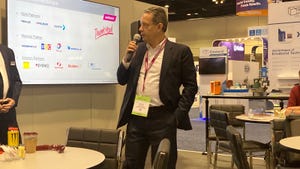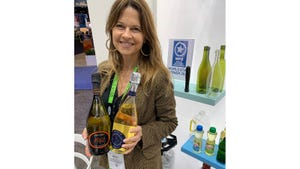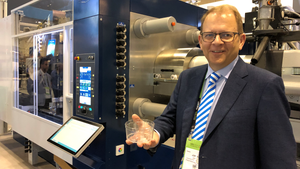Training Engineers For Market Requirements
April 1, 1997
Rapid tooling and prototypingare subjects emphasized at |
One of the visitors to IMI's Aseanplas stand in Singapore was HomayaunKhalili, a lecturer at Singapore Polytechnic. He and his Institute, togetherwith the German?Singapore Institute (GSI) in the Nanyang Polytechnicand two additional polytechnic institutions, provide training for plasticsengineers in Singapore ? training unique to this part of the world.
Students start their education at the Polytechnic immediately aftercompleting their general school education. Polytechnic graduates are soughtafter by industry, but they also have the option of switching to the Universityand obtaining a higher degree. The age at which students take up theirstudies varies between 16 and 19 years, depending on military service.The training course lasts six semesters.
The Electronics Impetus
There is scarcely a manufacturer of computers, communication electronics,or consumer electronics of worldwide renown whose premises are not evidentin Singapore. Manufacturing in electronics has moved from chip productionto the production of entire assemblies and now to the production of completeproducts.
Rapid product development is crucial in this particular area of industry.The Institutes in Singapore have geared the contents of their trainingcourses to this particular fact.
Inside Singapore Polytechnic
Homayaun Khalili's guided tour starts in the Rapid Prototyping andRapid Tooling Department. The latest equipment is in evidence everywhere:an RP unit for Fused Deposition Modeling (FDM) produced by Stratasys, avacuum casting unit, milling machines for electrode production, spark erodingunits, HSC milling machines, plus the full range of accessories. Each studentlearns how to operate all the different machines and even to produce cavityinserts. The main focus of activity in the laboratory is work on projectsfor industry ? whether in product development for portable telephonehousings or in process development for DVDs in new grades of polycarbonate,as commissioned by Bayer.
The stages prior to rapid prototyping and rapid tooling, i.e., thedesign and layout of injection moulds, for instance, form an extensiveintegral part of the compulsory training program. Singapore Polytechnichas several rooms full of workstations on which all students receive manyhours of training in AutoCad, Euclid, Moldflow, standard component libraries,and other software relating to plastics or mould building. Each studentis required to complete between 20 and 80 hours of practical training oneach software package as a mandatory part of the course. Indeed, futurestandard industrial software is already running in beta versions here andbeing tested for its stability.
Implementation in series production can then be tested in the Polytechnic'sown injection moulding development plant. This houses machines based ondifferent design principles from different manufacturers. The unmistakablearoma of fruit greets visitors at the door; students are using an injectionmoulding machine to see how children's erasers made of PP can be filledwith flavouring agents and calcium carbonate and still be suitable forcoloured printing: this is research geared to practical needs. Regularvisits by the lecturers to machine suppliers and their contacts on tripsto Singapore ensure a constant liaison with machine builders. An extensiverange of available test equipment familiarizes students with the laboratoriesin large injection moulding companies, placing great value on quality managementand production continuity.
Automation for Mass Production
At the German?Singapore Institute, which now belongs to NanyangPolytechnic, a guided tour is provided by Klaus Krüger, director ofthe Institute since it was first founded in 1980. The Institute was originallyset up within the framework of German development aid and funded equallyby Germany and Singapore. Since 1993, it is no longer a showcase of Germantechnology, but a polytechnic training center within the NYP and is currentlyfunded almost in its entirety by the city of Singapore.
The environment at the GSI is similar to that at Singapore Polytechnic:rooms full of workstations with the latest plastics processing software,rapid prototyping and rapid tooling, generally acquired and financed incooperation with German companies. This Institute goes one step furtheralong the process chain: the GSI provides students with the necessary groundingand experience to ensure that products which have been rapidly developedto market maturity can also be reproducibly mass?produced at low cost.Different automation techniques, such as the mounting of components onprinted circuit boards, the alignment and feed of individual components,and complete assembly operations are planned, designed, built, and testedhere in a team. Extensive laboratories and the necessary electronics, sensor,pneumatic, and control technology components are all available.
Exchange programs bringing students into local or foreign productionplants at regular intervals ensure that students gain some practical experiencein industry. The plastics engineers have no difficulty in finding a job.Half of the graduates find a job in the plastics sector ? the percentageis no higher in technical colleges and universities in Europe and America.
The successful GSI concept is being merged with the French?SingaporeInstitute (FSI) and the Japanese?Singapore Institute (JSI) in Singaporeto form the Engineering School within Nanyang Polytechnic. The GSI andits concept have also disseminated ideas and personnel in other countriestoo; in Indonesia, Malaysia, and Thailand, Institutes have already beenset up and are still being set up on the basis of this same model, withpersonnel trained in the GSI.
The two Institutes have one thing in common; they train young peoplefor precisely what industry in the region needs and for precisely whatensures the success of manufacturing industry in Asia?Pacific: therapid translation of product ideas into finished products. Even if themajority of patents for raw material developments and mechanical and processengineering are still held by Europe and America, the young plastics engineersin Singapore have been given the tools they need to develop products rapidlyfrom concepts and ideas and to have them produced in automated processeswith high quality and high volumes. And this, after all, is where Singaporecompanies are now a decisive step ahead of their European and Americancompetitors ? in translating ideas rapidly into cash
You May Also Like



